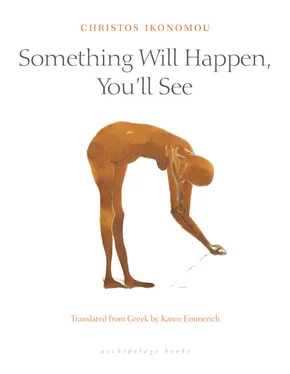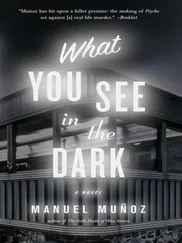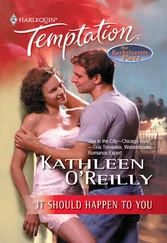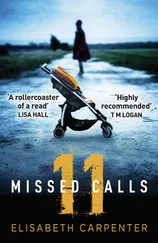That’s the kind of thing Takis has been saying recently. But tonight is different. Tonight as we sit by the window in the dark and outside it’s like wartime like the occupation with darkness all around and the streets deserted and your heart freezing from the cold and dark — tonight Takis says other things. A little while ago he got up and found a gas lamp and lit it and made his boss go home — a blonde from Smyrna who’s not all there in the head and who’s crazy about the singer Stelios Kazantzidis and pronounces all kinds of words as if she were still back in Turkey, like köftes for keftes — and then came back to the table and looked at the strange sign in the square and asked me:
What kind of tsipouro do you want? With anise or without?
There’s no wine?
Of course there is.
What are you drinking?
Tsipouro.
With anise or without?
Without.
Pour me one too.
He brings over the bottle and some smoked herring and olives and a monkfish tail and some boiled nettles then sits and picks up right where he left off. He talks about the old days. He talks about how things used to be around here for the refugees who came over in in those stinking boats in ’22 and had their heads smeared with tar and how they built their first huts out of mud and had to dig wells for water and then he talks about the years after that when things got a bit better, about the peddlers who used to wander through the streets — the vegetable guys selling cucumbers and purslane, the fishmongers who brought tiny smelt from Faliro and jars of tuna or pickled fish, and the guys selling salep who crushed ice in the summer and mixed it with sour cherry juice and made something they called karsabats which you drank and felt lighter somehow and for a little while you could forget your troubles.
Takis is drinking tsipouro and staring at the advertisement in the square which keeps getting lit up for an instant by the headlights of cars coming down Kondyli and then is plunged into darkness again. He drinks some tsipouro and takes a bite of herring and talks about the old times when thousands of wild poppies used to grow here in spring and the women would gather the seeds from the poppies and knead them into bread and rusks and the boys would pick the poppies and close one hand around the big red flowers and slap it hard with the other so the poppies would burst and the petals would fly out with a paf! and their hands would turn red as if they had killed some living thing with a heart and blood and on Good Thursday the girls would gather poppies for the bier because everyone knows a poppy sprouted from the ground in front of the cross at Golgotha and it was Christ’s blood dripping from above that gave the poppy its red — that’s what Takis says clapping his hands to show me the sound it used to make when the kids popped the petals and then he talks about the war and the occupation and the famine and how many people died here of hunger during the occupation women and children and old people.
Like right there across the street, he says. Back then there was a well in the square and one night a girl fell in and died, dizzy from hunger or desperation, who knows. They say if you passed by at night you could hear her crying in the well and shouting for help. But now there’s nothing to fear. Now that they’ve put asphalt over everything the roads and the squares those days are over the dead with the dead and the living with the living. Later on in ’42 they had food lines here and a little girl came one day dressed in boy’s clothing with a charcoal mustache on her face, she’d drawn herself a little mustache and people saw it and wondered. And when they asked about it she told them her mother had died of hunger and her grandmother too and all the girls in her family had died of hunger and that’s why she’d dressed as a boy, you see, in order to trick death — he’ll think I’m a boy she said and he’ll let me live. For god’s sake, that’s what she said. Just a little girl no more than seven or eight. You see what I mean? She’d drawn herself a tiny little mustache out of charcoal. And put on boy’s clothes. To trick death.
Then Takis falls silent and looks out the window again at the sign on the square that says Immortal Cabinets Out of Aluminum and Galvanized Steel 100 % Guaranteed 14 Maditou Street Across from MICROLAND and he takes a sip of his tsipouro and swallows slowly and doesn’t say anything for a while. But I feel a strange agitation. I feel like I’m hearing everything not with my ears but with my heart. The sounds hit me in the chest. Takis’s voice and the hum of cars coming down Kondyli and the wind whistling through cracks around the windowpanes. I feel like my heart can hear the slow burn of our cigarettes and the click clack of the zippo and the hushed roar of the gas lamp on the table. Tonight I’m strangely agitated and I’m hearing everything not with my ears but with my heart. And I wonder if it’s a bad sign, if maybe I’ve started to lose my mind and it worries me because everyone knows — rich and poor — that to get by in times like these your heart has to be even deafer than your ears. Everyone says it, rich people and poor people alike.
Takis wipes his hands then takes out his tobacco and rolls a cigarette with one hand on his knee and lights it and looks outside.
Immortal cabinets, he says. What do you make of that?
An empty bus comes barreling down Kondyli. The sign appears for a moment, then falls into darkness.
She was seven or eight, Takis says and blows the smoke to the side. A little girl, see. She didn’t want to die, so she tried to trick death.
• • •
It’s a Saturday night but the place is empty. Outside it’s pitch black, just a few cars in the streets and even fewer people. The light from the gas lamp forms a hazy pale blue halo around the table and around Takis and me and fills the walls with strange shadows.
We look outside.
An old lady with a flashlight goes by. Then a girl on a bicycle. A bony pregnant dog, her belly dragging on the pavement.
It makes me afraid to see the world so dark, as if it were wartime or an occupation as if something terrible has happened. Then, for an instant, the fear becomes a kind of quietness when I think how outside it’s dark and cold but I’m inside where it’s warm, I’m protected, with light and food and tsipouro, and with Takis talking and talking and talking and that seems to me like the biggest comfort of all — a voice in the half-dark, a calm familiar voice, the voice of my friend, husky and sad.
I want to ask how he knows all this. How he knows what happened here in the old days, about the wells and refugees and food lines and sour cherries and poppies. How he knows that there was once a little girl who dressed as a boy and drew a charcoal mustache on her face to trick death. I want to ask how he knows all this, since he’s an islander, from Amorgos, and only came to live here when he met Lena. How do you know all that, I want to ask. Is it true or are you maybe just spinning yarns? But I don’t ask, I don’t say a thing, I just stare out at the dark street and that strange sign in the square and I stare at the pale blue halo from the gas lamp and the shadows trembling on the walls, unrecognizable shadows that don’t look like ours but like the shadows of dead people, ghosts that in tonight’s darkness dared to come back up into the world and sneak in here, into the Existence Ouzeri on the corner of American Ladies and Bythinia Streets across from a tiny drop of a triangle they call Peace Square, and sit down to hear what the living have to say for themselves these days to see what they’re eating and drinking. To take comfort. Or maybe to find out if the living still remember them or if they’ve been forgotten entirely.
Читать дальше












